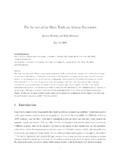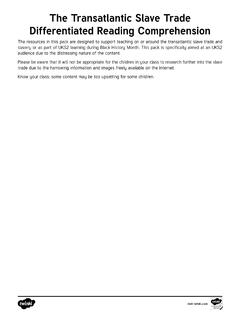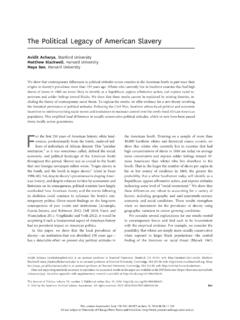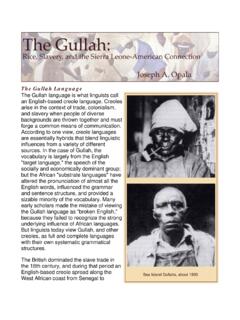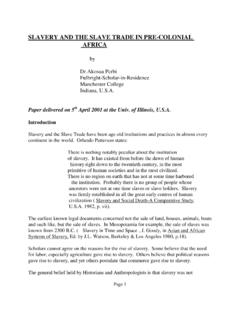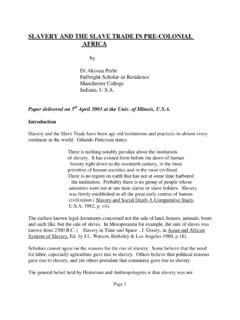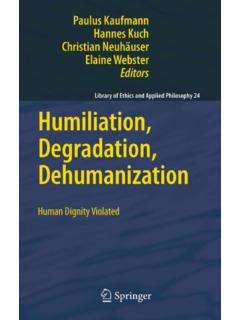Transcription of Slave Laws of Georgia, 1755-1860
1 Slave Laws of Georgia, 1755-1860 . Creating A More Educated Georgia . 1. Law is interpreted differently across the state. Portions of Georgia remained frontier until 1830s. More primitive conditions, judges, clerks, lawyers, jurors with different qualifications and priorities. There is no centralized judicial review until 1846. Superior Courts are court of appeal for lower court decisions, but there are multiple superior court districts. Supreme Court authorized in 1845, first cases heard in 1846. Laws passed by the legislature are repetitious, duplicated. Creating A More Educated Georgia . 2. Colonial Slave Law, 1755. Passed after slavery was allowed in Georgia in 1750 and after Georgia became a Royal Colony in 1754. Based on South Carolina Slave Code of 1740. Renewed in 1765. Revised in 1770. Revived after Statehood along with other Colonial Acts by Revival Act of 1784.
2 Creating A More Educated Georgia . 3. Legislative Intent Creating A More Educated Georgia . 4. Legislative Intent Whereas, from the encreasing number of slaves in this province, it is necessary, as well to make proper regulations for the future ordering and governing such slaves, and to ascertain and prescribe the punishment of crimes by them committed, as to settle and limit, by positive laws, the extent of the power of the owners of such slaves over them, so that they may be kept in due subjection and obedience, and owners, or persons having the care and management of such slaves, may be refrained from exercising unnecessary rigor or wanton cruelty over them, Creating A More Educated Georgia . 5. Legal Status Creating A More Educated Georgia . 6. Legal Status All Negroes, Indians, Mulatoes or Mestizos (except those already free) who now are or shall hereafter be in this province and their issue or offspring born or to be born are hereby declared to be and remain for ever after absolute slaves.
3 Follow the legal condition of the mother (not the father). Deemed in law personal chattels. Can sue for freedom. Guardian must file suit, as property slaves (and free people of color) have no legal standing. Burden of proof is on the plaintiff ( Slave ). Creating A More Educated Georgia . 7. Legal Status Legal responsibility for enslaved persons includes master (owner) and persons having charge or government of Slave . (overseer, white family member, white employee). Under colonial law, penalties for white offenders usually consist of fines, whipping or corporal punishment for slaves. After statehood and establishment of county jails and State Penitentiary in 1817, penalties for white offenders include imprisonment. In language of the law, a person is a white person (and usually male). Qualified by person of color.
4 Creating A More Educated Georgia . 8. Passes, Permits or Tickets A Slave cannot go alone out of the town or plantation where they live unaccompanied by a white person, or without a letter or ticket signed by the master or person in charge. Any white person can apprehend and moderately correct a Slave who is without a ticket or pass. Any white person who forges a ticket for another person's Slave (property) is fined. No more than 7 men slaves can travel high roads together unaccompanied by a white person. Creating A More Educated Georgia . 9. Passes, Permits or Tickets Every owner of a plantation with 25 slaves over the age of 16 must retain one white man capable of bearing arms . fine, 5 per month. (1770). Modified, every owner who keeps 10 or more slaves over 16 must keep a white man capable of bearing arms as an overseer, manager or superintendent, same fine.
5 (1823). Creating A More Educated Georgia . 10. Crimes of Masters and White Persons Regarding Slaves Beating, maiming, disabling a Slave employed in the lawful service of his master. Concealing or conveying away a Slave accused of crime to avoid trial. Master is fined up to 200 for capital crimes. Employing slaves to work on the Sabbath. A retailer giving or selling beer or liquor to Slave . Hiring slaves without ticket from master, per diem fine. Working slaves more than 16 hours per day. Creating A More Educated Georgia . 11. Crimes of Masters and White Persons Regarding Slaves Denying sufficient clothing, shelter, food Harboring or entertaining a runaway Slave . Slave stealing, inveigling. Allowing persons of color or slaves to beat drums, blow horns or allow public meeting or feastings of strange slaves. Teaching slaves to write or employing them as scribes.
6 Teaching slaves to read outlawed 1770, re-enacted 1829 along with free persons of color. Creating A More Educated Georgia . 12. Crimes of Masters and White Persons Regarding Slaves 1798 Constitution: Article IV, Section 12. Any person who shall maliciously dismember or deprive a Slave of life shall suffer such punishment as would be inflicted in case the like offence had been committed on a free white person, and on the like proof, except in case of insurrection by such Slave , and unless such death should happen by accident in giving such Slave moderate correction. Prior to 1799, killing a Slave , punished with progressive fines. After 1799, charged with same offense and punishment as killing a white person. Manslaughter, the penalty is branding. (1799). Creating A More Educated Georgia . 13. Crimes (Penal Code). Cruel treatment, including excessive beating or whipping, withholding food or clothing, overworking, was incorporated into the Penal Code.
7 (1817). Extended to include employers (1833), overseers, biting or tearing with dogs. (1852). Employing (using) a Slave in store, bar or shop selling spirituous liquors. (1835). Creating A More Educated Georgia . 14. Assembly Justice of Peace may empower Constable (Sheriff) to disperse any assembly or meeting of slaves which may disturb the peace. Sheriff authorized to search for arms, ammunition, stolen goods. Owners fined for allowing public meeting or feastings of strange slaves or strange persons of color. No congregation or company of negroes shall under any pretense of Divine worship, assemble themselves, contrary to the act for regulating patrols. (1792). Creating A More Educated Georgia . 15. Assembly No person of color, free or Slave , shall be allowed to preach or join in any religious exercise with any person of color, free or Slave , where more than 7 persons of color are present.
8 Must have written certificate from 3 ordained ministers of their order (denomination). Must have written permission of county justices of Inferior Court. Must have written permission of mayor or chief officer. (1833). Creating A More Educated Georgia . 16. Working Unlawful for a white person to buy, sell, trade, barter, etc., for any goods or commodities from a Slave . Slaves are not allowed to keep boat or canoe or raise horses or cattle. (1770). Any person can seize goods or articles and take to Justice of the Peace, goods sold at public auction. Owners or persons in charge of slaves living within a town's limits can give slaves a license to sell, with quantity and quality of goods specified in signed license. Unlawful to allow a Slave to work outside their respective houses or families without ticket. Both owner and employer fined.
9 (1770). Creating A More Educated Georgia . 17. Working No white person shall buy or sell from a Slave without a ticket authorizing him to do so cotton, tobacco, wheat, rye, oats, corn, rice, or other article. (1816). Amended to except such articles that are known to be usually vended and manufactured by slaves. (1824). Amended in Penal Code of 1833 to specify articles vended and manufactured by slaves: brooms, baskets, foot and bed mats, shuck collars, and such other thing.. Creating A More Educated Georgia . 18. Runaway or Fugitive Slaves Lawful for any person to apprehend and secure any runaway or fugitive Slave . Required to send Slave to master OR. Deliver to District Constable (Sheriff). Sheriff to advertise (by 1860, in newspaper advertising county's sheriff's sales). Schedule of fees for food, lodging, travel paid by owner/agent to Constable/Sheriff.
10 Constable (sheriff) can detain Slave until fees are paid. If fees remain unpaid, he can sell Slave at auction. If Slave not claimed in 18 months, sold at auction. By 1860, time to claim runaway slaves reduced to 3 months. Creating A More Educated Georgia . 19. 1802. Creating A More Educated Georgia . 20. Five Dollars Reward Run Away from the subscriber, on Thursday the 20th inst. a negro woman named MIRABELLE in French, but in English FANNY, about thirty years of age, short and thin, well known in Augusta and its vicinity, branded on the breast VERDER. St. MARC. It is very probable she will Georgia make for Mr. John Fox's or Mr. Milledge's Chronicle plantation, or to Mr. Ananias Cooper's (Augusta), mills, having a husband at each of the above places. As I am told some person June 5, 1802 wished to purchase her, any person may have her for five hundred dollars.


